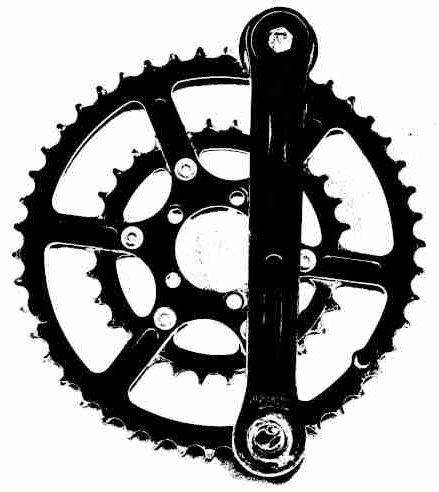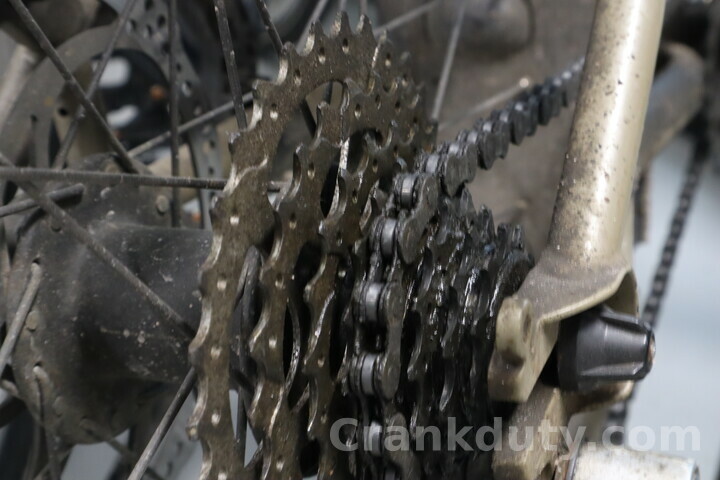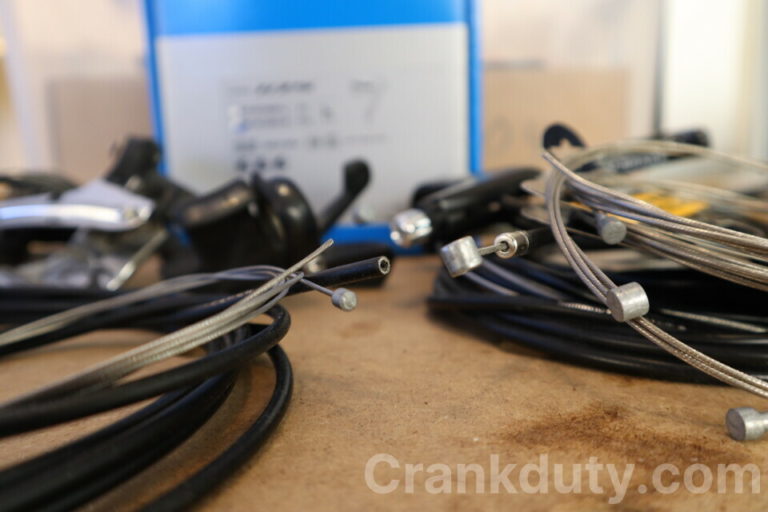Pedal Washers – Do You Really Need Them?
Many cranksets and pedals ship with pedal washers, which are just thin plain washers to go between the pedal and the crank. But these washers are also often omitted – with no obvious negative consequences. So what are they really good for?
This article tells you the pros and cons of pedal washers and when you should use them. The short answer is that pedal washers save the crank arm from damage due to the pedal and may sometimes make the pedal-to-crank connection more secure. They are worth installing in most cases.
Pedal washer Pros
1 Washers save crank face
The main benefit of pedal washers is that they save the crankarm face from being gouged by the pedal.
Without a washer, the pedal axle has a tendency of eating itself into the softer crank face on tightening. The reason is that the pedal axle is usually steel and much harder than the crank, which today is aluminum or carbon fiber.
The crank surface damage is typically not a major issue. But it is worth avoiding if possible: the marks look ugly and may in some cases make the pedal more difficult to remove.
A pedal washer saves the crank face by acting as a buffer between the pedal and the crank. It spreads the pressure from the pedal axle shoulder more evenly onto the crank face. Further, it prevents direct sliding contact between the rough pedal shoulder and the crank face, which is the
2 Washers may cure clicks
The pedal–crank connection is often a source of crankset creaking and clicking noises. Adding a pedal washer may sometimes cure the clicking noise.
Pedal clicking is a complex phenomenon that depends on the frictional conditions in the pedal–crank connection. A pedal washer changes the setting by making the contact onto the crank much smoother and by introducing a second interface into the joint.
The change in the interfaces may turn a clicking pedal into a non-clicking one. This is not guaranteed to happen, but is typically very easy and worth trying.
NB. Pedal washers may in fact also make the opposite: they may make your silent pedals click, or make a clicking pedal click worse. Sometimes the harder and lower-friction interface that the washer introduces does not help.
3 Washers help with poor pedal design
A third potential benefit of pedal washers is that they allow a poorly designed pedal to be attached more securely to the crank.
This point is a bit more involved to explain, but I will keep it short. Simply put, the pedal washer secures the connection by increasing the length of pedal axle that is under tension in the threaded crank connection. It does this by offsetting the axle shoulder from the crank face and leaving a length of thread in the air.
Having more screw length under tension is an advantage in any threaded connection, because it secures the connection from loosening due to the parts settling or vibration. The screw acts like a tensioned rubber band: it keeps pulling the axle shoulder to the crank face even if things move around a bit.
The increased tensioned length is particularly useful with some poorly designed pedals which lack proper thread relief. A well-designed pedal has some tension length built into the axle through a small non-threaded section near the shoulder. Some poorly engineered pedals do not have this and are difficult to tighten reliably. (You will feel such a pedal getting tight very suddenly, without a gradual build-up of torque.) Adding a pedal washer brings some tension length to the joint and may allow it to stay tight in service.
Pedal washer Cons
There are only a few potential downsides to pedal washers:
- A thick washer may not allow a pedal with a short thread to fully engage with the crank thread. This is rarely an issue with standard washers and pedals.
- A pedal washer may cause pedals to click in some conditions
Neither disadvantage is very likely – unless you have an issue, do not let them deter you.
When should you use pedal washers?
Pedal washers have more potential pros than cons so they should be used by default if available. They are rarely a critical component, though, so you can also go without them in most cases.
Pedal washers are highly recommended with carbon cranks and pedals with a narrow shoulder.
When should you not use pedal washers?
Pedal washers should not be used when you have limited thread engagement between the pedal and crank to begin with. Using such a pedal and crank arm together is not a good idea anyway, but the washer will make it worse.
Removing a pedal washer is something you can try to cure a persistent pedal click. Washers sometimes cure clicks, but sometimes they also cause them.


